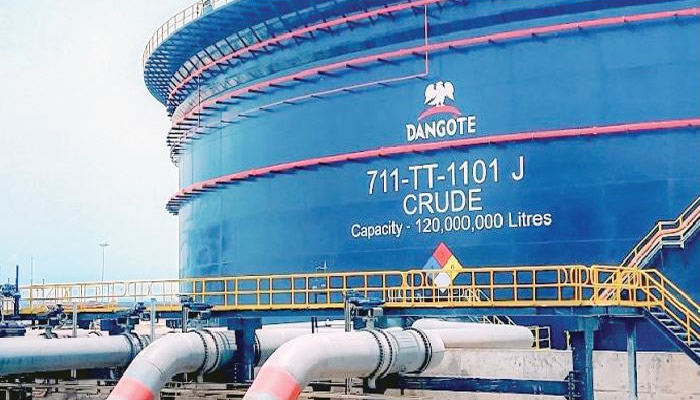The Dangote Petroleum Refinery, Africa’s largest single-train refinery, has reportedly reduced its crude oil intake in recent weeks as part of an operational adjustment to optimize production efficiency and manage feedstock supply challenges. The move comes amid fluctuations in global oil prices and logistics issues affecting crude delivery from both local and international suppliers.
According to industry sources, the refinery, which began production earlier this year, scaled down crude processing volumes temporarily to recalibrate its production systems and align output with market demand and refinery capacity optimization goals. The decision, analysts say, is strategic rather than a sign of operational weakness.

The Dangote Refinery, with an installed capacity of 650,000 barrels per day (bpd), has been receiving crude from both the Nigerian National Petroleum Company Limited (NNPCL) and other international traders since it commenced operations. However, sources indicate that the recent supply disruptions, coupled with maintenance procedures, prompted the refinery to temporarily reduce its daily crude intake to between 350,000 and 400,000 bpd.
A senior management official familiar with the development explained that the refinery’s focus remains on maintaining high product quality and ensuring sustainable operations despite the reduction in crude feedstock. “This adjustment is part of our operational efficiency measures. It allows us to balance production, manage inventory, and ensure product quality remains at global standards,” the source said.
Industry experts have emphasized that such production adjustments are common in large-scale refineries during their first year of operation. Dr. Bala Zakka, an oil and gas analyst, noted that refining processes often require periodic system calibration to ensure maximum performance and prevent equipment strain.
“The Dangote Refinery’s decision to reduce crude intake is a technical and commercial decision. During early operations, facilities undergo optimization phases to fine-tune their systems. It does not imply a setback but a necessary step toward stabilizing long-term output,” Zakka explained.
Despite the reduction, the refinery continues to produce diesel, aviation fuel, and naphtha, while preparations are ongoing for the commencement of premium motor spirit (PMS) production. Sources suggest that once the calibration phase concludes, the refinery’s intake and output will rise again to meet Nigeria’s domestic fuel needs and export commitments.
The refinery’s management also cited the volatility in global oil prices as a factor influencing short-term crude intake decisions. With Brent crude prices hovering around $83 per barrel, fluctuations in crude cost and shipping timelines have posed challenges for refineries managing large volumes of feedstock.
Additionally, the Nigerian Upstream Petroleum Regulatory Commission (NUPRC) has acknowledged temporary logistics constraints affecting crude supply to local refiners, including Dangote’s facility. The Commission, however, assured that efforts are underway to streamline supply chain coordination and ensure steady feedstock availability.
The reduction in crude processing has, however, sparked discussions on its potential short-term impact on Nigeria’s fuel supply and foreign exchange savings. Since the refinery’s commencement, the federal government has projected a significant reduction in fuel imports and an improvement in forex stability due to domestic refining capacity.
An economist, Dr. Aisha Mohammed, said the refinery’s short-term reduction might slightly delay Nigeria’s self-sufficiency in refined products but expressed confidence that the move will lead to more stable and sustainable operations. “Optimizing refinery operations now will yield long-term efficiency. It’s better to stabilize production than rush into full capacity with unresolved bottlenecks,” she said.
Meanwhile, the NNPCL, which holds a 20 percent stake in the Dangote Refinery, has reassured that crude supply to local refiners remains a national priority. Group Chief Executive Officer Mele Kyari stated that the corporation is working closely with the Dangote Group to ensure consistent crude allocation under the Domestic Crude Supply Obligation (DCSO) policy.
Kyari noted, “We are fully committed to ensuring that all local refineries, including Dangote Refinery, get sufficient crude to operate optimally. Minor supply adjustments are part of routine coordination within the value chain.”
The Dangote Refinery remains a cornerstone of Nigeria’s energy transition and economic diversification strategy. Once fully operational, it is expected to meet Nigeria’s domestic fuel demand and export surplus refined products to other African markets.
Analysts also highlight that the refinery’s temporary reduction in crude intake could be linked to ongoing efforts to balance domestic pricing dynamics and product distribution logistics. The plant’s diesel and aviation fuel outputs have already contributed to stabilizing prices in Nigeria’s downstream market, while the expected entry of petrol production could further reduce import dependency.
Despite the temporary adjustment, market watchers maintain that the refinery remains on course to transform Nigeria’s oil and gas landscape. Its full-scale operation could save the country billions of dollars annually in import costs, create jobs, and strengthen the naira by easing foreign exchange pressures.
As the Dangote Refinery continues to fine-tune its operations, stakeholders and government agencies are optimistic that the current slowdown will pave the way for enhanced output, improved efficiency, and greater stability in Nigeria’s energy sector in the coming months.
Support InfoStride News' Credible Journalism: Only credible journalism can guarantee a fair, accountable and transparent society, including democracy and government. It involves a lot of efforts and money. We need your support. Click here to Donate
